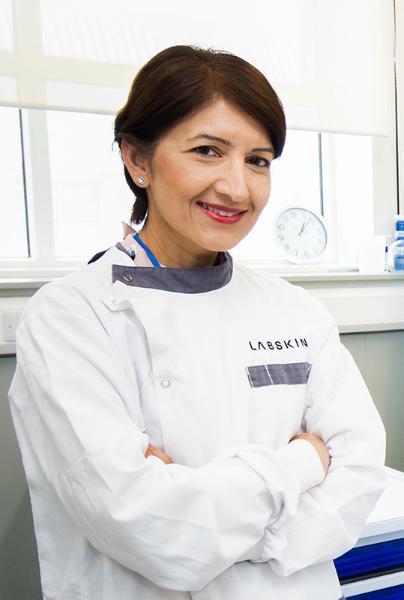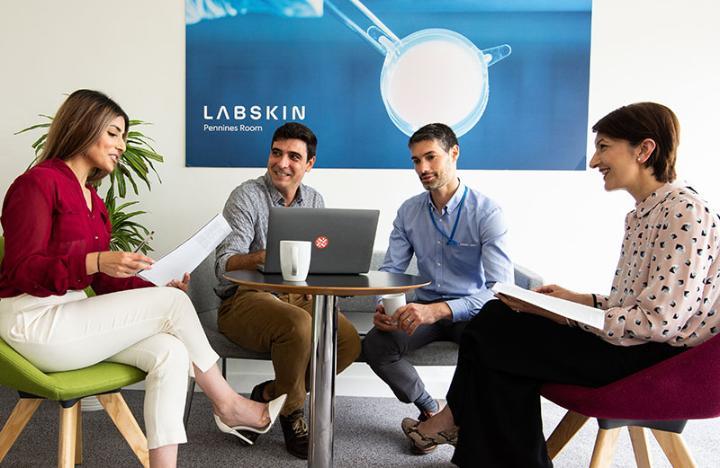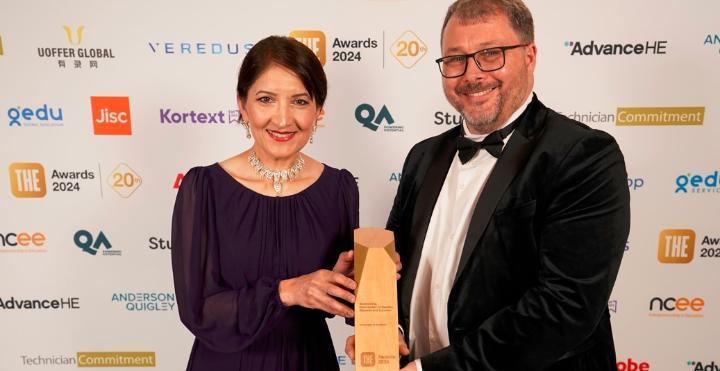Academic Profile - Dr Sobia Kauser
Challenging pigmentation inequalities and championing disabled students
Dr Sobia Kauser is an Associate Professor of Biomedical Science in the Faculty of Life Sciences. Her research focuses on the biology of skin with particular interest in the hair follicle, and she is also passionate about reducing pigmentation inequalities in health care. She recently received the prestigious Times Higher Education Award for her project that facilitates reasonable adjustments in the laboratory environment for disabled students.
How did you come to the University of Bradford?
I was an undergraduate student in Biomedical Science here at the University of Bradford and my intention was to go on and study medicine. However, after my final year project, one of the supervisors asked me if I was interested in doing a PhD, so I decided to give it a go. Going straight from a BSc to a PhD was quite difficult initially, as I didn't have that level of expertise and experience that others had, but I rose to the challenge and I think I was pretty successful - I was one of the first people to create a functional in vitro (created in a lab environment) model system for hair follicle melanocytes, which are the cells that give our hair its unique colour. This was based on work my supervisor had pioneered, which I developed further and utilised in new ways. My research interest in pigmentation biology stemmed from there, and I continued at the University to do post-doctoral research.

Dr Sobia Kauser
Tell us about some of your research projects...
My research has continued to develop the themes of my PhD, including the regulation of hair and skin pigmentation, and this has included work on melanomas (a type of skin cancer) and melanocyte ageing. It’s also involved working with companies on Knowledge Transfer Partnerships (KTPs), where organisations use University expertise to solve specific challenges - and one such successful project was with LabSkin.
LabSkin develop laboratory grown human skin equivalents which can be used to test skin care products, cosmetics, health care, drug delivery and wound care, which avoids the need to test on humans or animals. The difference we were able to make was the addition of the melanocyte component to give pigmentation to the skin models, and this superior product has the potential for use in regenerative medicine for personalised skin grafts and reproducible melanoma models for the pharmaceutical industry.
I’ve recently been talking to LabSkin about more KTP opportunities to further develop the skin equivalent model.

Dr Kauser (right) with colleagues on the LabSkin KTP.
Pigmentation inequalities in health care is something I’m particularly passionate about. People with dark skin tones experience harmful disparities in skin and wound healing care which cause higher levels of suffering and mortality than other members of the population. I am working with Dr Ray Samuriwo from Edinburgh Napier University on a project looking at this underexplored subject. Most people with dark skin - with higher levels of eumelanin pigment - receive suboptimal or inappropriate skincare, and harmful discrepancies in care quality are caused by a gap in wider knowledge and understanding about people with dark skin tones, even though they are in the global majority.
The quality of skin and wound healing care for people of all skin tones is dependent on evidence about the skin’s biology, microbiome, and ageing, and a key issue we are looking to address is the lack of research and understanding in the biology of dark skin.
Equality is also at the heart of the MaRiLU® project, can you tell us how this came about?
I think have been championing equality, diversity and inclusivity from a very young age without actually realising - I had a younger sister who had health issues and learning disabilities, so I was always advocating on her behalf. So, it seemed like a good fit when I was asked to by the programme lead to take on the role of Learner Support Profile Champion for my department, where I assist students that have learner support profiles (LSPs) the support package in place for disabled students. My role is to ensure that students are fully supported, their reasonable adjustments are accommodated, address any queries and to advocate for students if they need additional support.
I noticed that there was an increasing number of students with complex needs, including a student who needed specific adjustments in the laboratory environment. I investigated this, including from a Health and Safety perspective, but found out that there was nothing in place. I liaised with the Disability Services Manager and Stuart Walker in Disability Services with an idea to design a form to make sure that the risk assessments and reasonable adjustments could be accommodated. Stuart and I explored this further, and we came up with an innovative solution to digitise the process but also to involve students as co-partners, and this is where MaRiLU (Managing Risk for Impaired Laboratory Users) was born.
Can you describe the impact of the project, and the next steps?
Within the Faculty of Life Sciences more than 45 students have benefited from using the system. The MaRILU® system was designed with EDI principles at its core, it is a student-centred approach that places the student’s personal lived experience, knowledge, and expertise of their impairment(s) whether permanent or temporary at the heart of the student offer process. It was developed in partnership with students to co-produce an inclusive educational risk management and risk assessment system, for students who face barriers in laboratory settings to accommodate reasonable adjustments. This helps to create an inclusive laboratory learning experience for all students.
We were humbled and delighted to win the Times Higher Education Award 2024 in the Equality, Diversity and Inclusion category, at the awards ceremony in November last year. The project also received the VC's Outstanding Achievers award in 2023.

Dr Sobia Kauser and Stuart Walker with the THE award in November 2024.
In terms of next steps, we're hoping to roll out MaRILU® within other faculties, but we also want it to be available to other institutions. It is worth noting this development is not limited to science laboratories but has wider application across a range of other subjects where students are required to engage in practice within technical facilities.
MaRILU® is a registered trademark, and we are hoping to apply for funding to develop version two of the app which can be licensed to a range of organisations.
